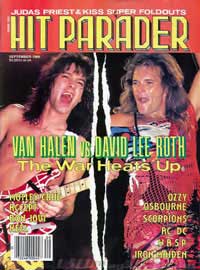Glory Bound
Canadian Trio Continue Power Windows World Tour
By Keith Elliot Greenberg, Hit Parader, September 1986, transcribed by pwrwindows

It was pennant-race time, and Rush's bassist/vocalist/baseball fan, Geddy Lee, was flying from Kansas City to New York. Relieved that no one on the flight recognized him, he had the luxury to relax and observe the other passengers. Upon glancing across the aisle, Geddy did a double take. There was Ernie Harwell, the voice of the Detroit Tigers. And behind Ernie were Tony Kubek and Bob Costas, NBC's baseball announcers. As most rock fans would do if they found themselves on an airplane with Geddy and his Rush-mates, Alex Lifeson (guitar) and Neil Peart (drums), the entertainer strained to listen to the sports mavens' conversation. "They were talking about the umpiring of the game the night before," he recalled "I couldn't make out what they were saying but, believe me, I was really trying."
Despite the fact that Geddy often stands in front of tens of thousands of screaming admirers, his dreams are the same as those of most North American boys. "If I close my eyes and pretend, I see myself as a major-league baseball player," he said. "But that's only one of 150-million fantasies. Sometimes I'm Frank Lloyd Wright, the architect, sometimes I'm a surrealistic painter."
We talked to Geddy about his beginnings and the changes Rush has seen over the years, in a conversation during the band's recent North American tour.
What was it like growing up in the Willowdale section of Toronto?
My dad owned a store. We were a middle-middle-class neighborhood. The upper end of the lower-middle-class, merchants and that kind of thing.
So how does a shopkeeper's kid become a musician?
I was about 12 and I was hanging out with a bunch of guys, listening to the Yardbirds. We thought, "Wouldn't it be neat to make some music?" I figured out how to play "For Your Love" on guitar. I don't remember what brand guitar it was. It was generic, like a 7-11 guitar. It looked pretty cool, with palm trees painted on it. I wish I still had it. I was so pleased with myself.
When did you compose your first song?
When I was 14. I don't remember what I named it. It was a 12-bar blues song, and it was like nothing, I just took a 12-bar progressive and said, "I wrote this." It was meaningless.
When did you and Alex begin playing together?
In 1969. We were kids then, but we had conviction. We went through different periods. There was the Cream period, the Blues Breakers period, the Who period. But we always tried to do originals to put everything we had into the music.
Rush was always an ambitious group. We'd try to play something more ambitious than what we did last. We wouldn't allow ourselves to stay in one place. Musically speaking, Alex and I had a thinking band, but lyrics were a pain. When Neil joined (after the group's self-titled debut LP in 1974), I said, "Now we have a verbal guy. He's perfect to write lyrics because he knows more words than us." Then we had a thinking-man's metal band.
How has the Rush sound progressed with the release of each of the band's eleven albums?
When we first started out, we were very imitative. Over the years, our tastes broadened until they were so broad that the influences didn't show in our music. Then we were unique and imitated ourselves.
Rush fans look at your fourth album, 2112, as being pivotal to the band's present popularity. It seemed to establish Rush as having its own sound and style. Had that album not been made would the band even be in existence today?
I doubt it. But that's a hypothetical question. It would be like asking, "Where would the band be today if you broke your arm on your first tour?"
Your latest album, Power Windows, is more uplifting than your prior works.
This is not really a record about survival like Grace Under Pressure was. It's about power. That doesn't mean a condemnation of power, just an examination of it. Power Windows is about the power of money, love and spiritualism.
Do you feel it's your responsibility to help educate the public?
It's my job to make music as good as my abilities allow, not to get fans thinking. While I'm doing what I'm doing, it is a bonus if I, in some way, stimulate thought.
Still, do you think metal bands today generally have "so much style without substance"?
Yes, most metal bands sound the same. There's a frightening lack of desire to break from the standard metal clichés. But I like Metallica. They're a great metal band. They're real good and honest at what they do. In some ways, they remind me of Rush. They're trying to make their metal complicated, but also entertaining.
Where do you see yourself in the future?
I don't know where I'll end up. But I love music, and I'll always do it. To keep this band going is my biggest wish. We have a real nice little creative partnership. We can last a long time. I don't look at music as something that dries out. I have a whole lot of it left in me.